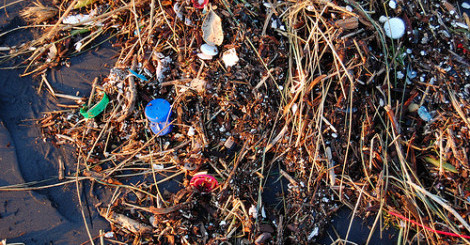

That bit of wisdom was offered as investment advice in 1967’s The Graduate. Plastics were the future then, and almost 50 years later, plastics are still the future, albeit for different reasons. For example, nearly all seabirds will be eating plastic by 2050 according to a recent study. There’s a lot of plastic debris floating in the oceans, most of it in tiny pieces. Birds (and fish and other marine life) inadvertently eat it to their detriment; the negative consequences can be immediate or cumulative. Eventually, that plastic can even wind up impacting our food supply since we eat the animals that are eating plastic.
Fortunately, this situation is widely acknowledged and efforts are already underway to reduce the production of new plastic waste and to clean up what’s already there. Also in the news this week is the completion of a project to survey and map plastic debris in the oceans, so that cleanup efforts can target resources where they can do the most good. That doesn’t mean we shouldn’t individually reduce our plastic consumption and waste, recycle as much as possible, and dispose of the rest responsibly. It does mean the problem is tractable, progress is possible, and we should press on towards a future with less plastic.
Interestingly, what makes plastic so attractive is also what makes it so troublesome — it’s very durable, at least chemically. It doesn’t readily break down via the chemistry that occurs naturally around us; that means it won’t rot, but that also means… it won’t rot. The desire to create and possess durable goods is understandable, and one the Bible acknowledges and even affirms to an extent. Yet maybe there is also a kind of grace in building things which won’t last. At least that way, if there are unforeseen negative consequences, they won’t continue indefinitely. We shouldn’t make more disposable items to accumulate in landfills, but we should consider materials which can be reused or remade, either by us or our microbial helpers (who are also chipping in on the plastic). As the Vision said: “a thing isn’t beautiful because it lasts.”
I chose this topic in part because of survey responses from my readers (Thanks!). If you want your interests reflected in future science blog posts, there’s still time to complete the survey and be entered into our giveaway!
Andy has worn many hats in his life. He knows this is a dreadfully clichéd notion, but since it is also literally true he uses it anyway. Among his current metaphorical hats: husband of one wife, father of two teenagers, reader of science fiction and science fact, enthusiast of contemporary symphonic music, and chief science officer. Previous metaphorical hats include: comp bio postdoc, molecular biology grad student, InterVarsity chapter president (that one came with a literal hat), music store clerk, house painter, and mosquito trapper. Among his more unique literal hats: British bobby, captain’s hats (of varying levels of authenticity) of several specific vessels, a deerstalker from 221B Baker St, and a railroad engineer’s cap. His monthly Science in Review is drawn from his weekly Science Corner posts — Wednesdays, 8am (Eastern) on the Emerging Scholars Network Blog. His book Faith across the Multiverse is available from Hendrickson.

Well said, Andy! Reducing waste means designing and managing products and processes to systematically avoid and eliminate the volume and toxicity of waste and materials, and the best part is everyone’s invited!
Thanks, Sarah! Since I posted, another discovery was made of plastic-digesting worms. Indeed, all of creation is invited to help improve our situation.